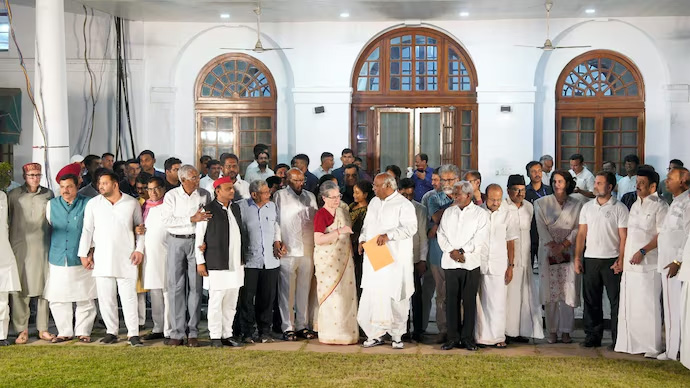By Dr. Gyan Pathak
The recent Delhi elections have illustrated that the opposition INDIA bloc resembles a crumbling structure, with its foundational components failing. To claim that two of its allies – Congress and Aam Aadmi Party (AAP) – have distanced themselves would be an understatement. The Congress is not only striving to undermine AAP’s hold on power but also, Delhi Congress leader Ajay Maken launched severe critiques against AAP and its leader Arvind Kejriwal, leading to threats from AAP leaders to advocate for Congress’s removal from the INDIA bloc if they did not take action against their Delhi counterpart. Subsequently, several allies within the INDIA bloc rallied behind AAP during the Delhi elections, leaving Congress isolated in the opposition.
Ajay Maken, who serves as the treasurer of the All India Congress Committee, is a prominent figure in both Delhi and at the national level. Following the publication of a 12-point “white paper” on December 25, targeting AAP and the BJP for mismanagement related to pollution, civic amenities, and law enforcement in Delhi, he labeled AAP leader Arvind Kejriwal as an “anti-national” and “Farziwal.” This aggressive approach was not supported by any reasonable leader within the INDIA bloc, including influential Congress figures like Rahul Gandhi.
Amazingly, AAP first took control of Delhi in December 2023 as the successor to Sheila Dikshit of Congress, who had been in power since 1998. Kejriwal’s ascent to chief minister occurred with Congress’s backing, despite AAP only managing to secure 28 seats and Congress just 8 in the 70-member assembly at that time. Since then, Congress has not won any seats in the 2015 or 2020 Vidhan Sabha elections. In a desperate bid to reclaim its lost influence, Congress seems to be poised for an all-out assault on AAP, disregarding coalition principles and the realities on the ground.
Indeed, AAP is facing a multitude of political challenges, including a decade-long anti-incumbency sentiment and a significantly diminished organizational strength. However, Congress’s gross misjudgment in thinking they could gain significant advantage by attacking an ally within the INDIA bloc is apparent.
For Congress, it would be prudent to grasp the significance of the INDIA bloc that extends beyond mere elections, seats, and power. The nation is in a precarious transition from predominantly socialist, secular, democratic, and federal governance to a more centralized far-right Hindutva politics. It is imperative for the INDIA bloc to not only be preserved but also revitalized with a proactive agenda.
At this point, elections and seat counts are less critical for Congress than ensuring that the political environment aligns with the ideals set out in the Preamble to the Constitution of India. Given Congress’s limited stakes in the upcoming 2025 state elections in Delhi and Bihar, where regional allies AAP and RJD are stronger, the party must contest independently in Assam against BJP in 2026 and align with left parties in Kerala. In Puducherry and Tamil Nadu, Congress plays a junior role to dominant regional parties, while in West Bengal, it has been rendered nearly irrelevant under Mamata Banerjee’s TMC.
The electoral landscape in these states should not distract Congress from maintaining the correct political course for the nation’s broader interests. The party must adopt a long-term view beyond the next two years. Prioritizing the INDIA bloc and coalition integrity is essential; otherwise, Congress will find itself reliant on regional allies in 2027 when key states like Uttar Pradesh, Uttarakhand, Punjab, Manipur, Gujarat, and Goa are up for election.
It is widely acknowledged that the INDIA bloc has become nearly dormant, particularly following the elections in Maharashtra and Haryana, largely due to the Congress leadership’s disinterest in energizing the alliance. The treatment of AAP by Congress in Delhi has raised concerns among other allies as well.
Despite Congress president Mallikarjun Kharge leading the INDIA bloc, the party has not convened a joint meeting with its allies. This neglect has prompted statements from RJD leader Lalu Prasad Yadav suggesting a leadership change in the INDIA bloc, advocating for TMC leader Mamata Banerjee to take the helm. Even Sharad Pawar of the NCP (SP) has acknowledged Mamata’s capability as a leader.
Congress must heed the signals in RJD leader Tejashvi Yadav’s remarks in Bihar as the state heads towards elections in 2025. He noted that the INDIA bloc was originally intended for the 2024 Lok Sabha elections and referenced their prior cooperation within the Mahagathbandhan, indicating Congress’s diminishing relevance in Bihar.
Support for AAP in the Delhi elections has also emerged from the Samajwadi Party, Trinamool Congress, and Shiv Sena (UBT). Jammu and Kashmir’s National Conference leader and Chief Minister Omar Abdullah has proposed disbanding the INDIA bloc if it is not intended to function beyond the 2024 Lok Sabha elections, asserting that their alignment with Congress is not solely about seats, thus highlighting the true purpose of the united opposition. He also expressed concern over the lack of clarity regarding the future of the alliance.
“It is unfortunate that no meeting of the INDIA bloc has occurred. Who will lead? What will be the agenda? How will the alliance progress? These topics remain undiscussed. There is no clarity on whether we will continue to stand united or not,” Abdullah remarked.
Collectively, these developments indicate an urgent need for the INDIA bloc to convene after the Delhi elections, to refresh its strategies and re-engage for the country’s greater good. Otherwise, the space for a socialist, secular, democratic, and federal republic may diminish even further. (IPA Service)


Leave a Reply